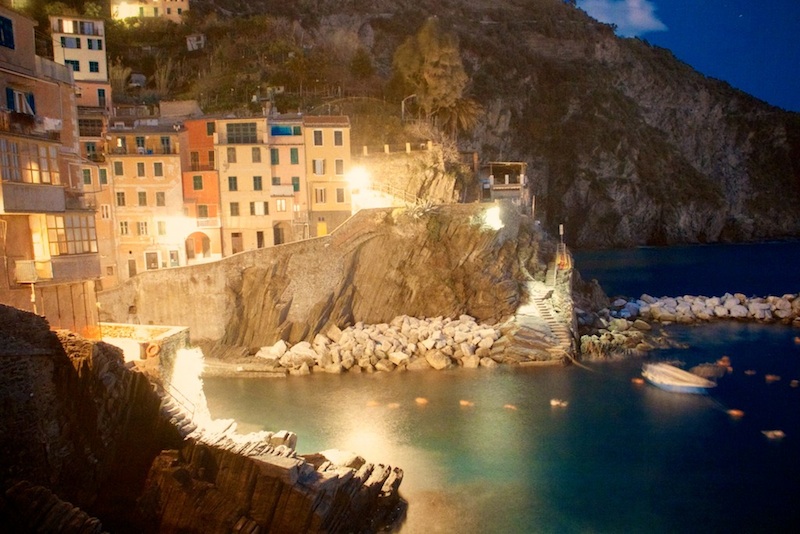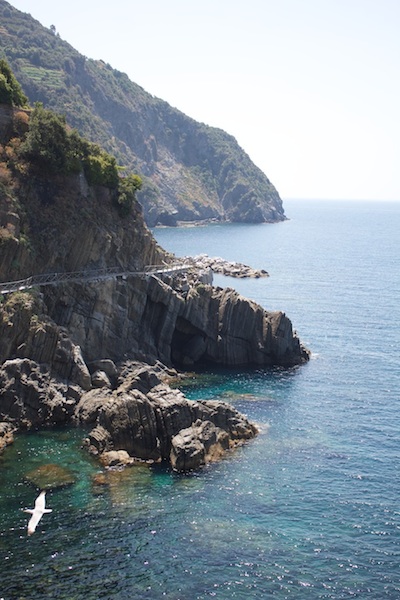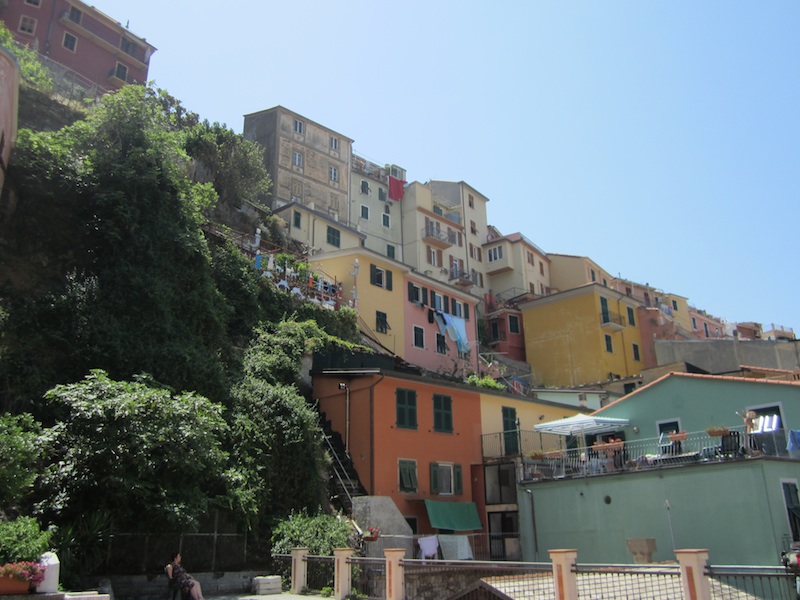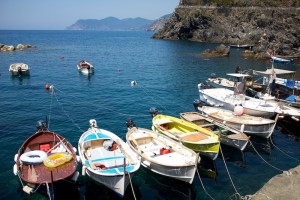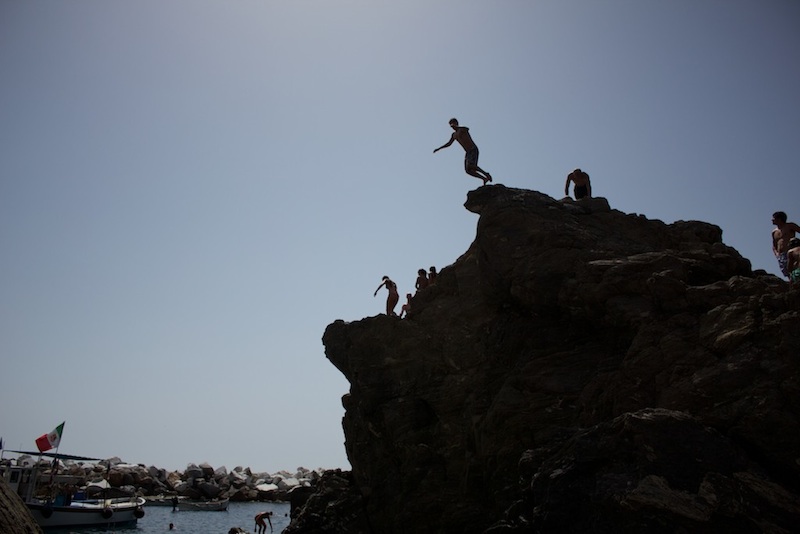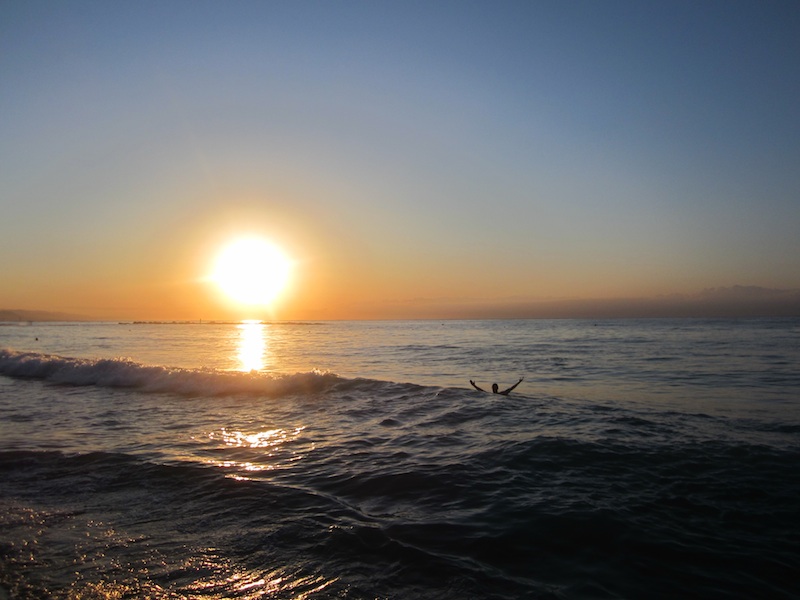This is a ten-part story about travel, soccer, a natural disaster, a Bluetooth speaker, seawater, and public nudity bringing people together in moments when language just won’t do.
The buildings are colors that want to be seen. From above they are a mess of right angles, compressed into each other, a neglected Tetris creation mashed onto M.C. Escher’s attempt at a sundrenched Monet, coming to life on the rocky Italian Riviera. Look out at the taste-in-your-mouth world and run your hands through its hair.
The spaces between places intrigue you. You walked all over the town, arriving here on a three-hour spray-painted train ride from Milan, and despite it being a small town, it was a tiring walk. The terrain rises significantly from sea level—the orange and pink and yellow buildings standing on the rocks are body-painted exhibitionist daredevils. You walked up severe stairways dissecting tight, old apartment buildings built into the hills and cliffs. These stairways are considered roads. Or at least mappable walkways. They are named—Via Antonio Gramsci, Via di Loca—and have road signs, though you can’t walk up them two people two Americans wide.
You are happy to now be sitting, eating very average pizza, racing liters of beer, the thick, brown glass bottles trying to beat you to warmth before you can finish them. Between sips, taste the teal air. Wait along with an entire country for the soccer football soccer to begin. The places at the ends of spaces reward you.
If you weren’t in Italy, you wouldn’t be cheering for Mario Balotelli, but these Italians don’t need to know that. Your blue T-shirt announces an alliance for the day, and that’s good enough for them. You think Balotelli, the fiery Italian striker with a bleached racing stripe of hair running from his forehead back, is obnoxious. You think he makes a lot of bad choices with the ball at his feet, and you might also be a little jealous of the flashes of greatness he shows that you can’t come close to replicating even in your men’s league back in Chicago. But these Italians don’t need to know that. You are all going to be friends for a night.
Maybe not all. Dan is sitting to your right, wearing a Germany jersey. He got it in Munich when you were bouncing around Europe during World Cup 2010. It’s the classic German white. It doesn’t seem right to wear white here in Riomaggiore, with all the angular buildings luminously clustering the bipolar hillsides, pink and light yellow, lots of orange and red, but everything with green trim, like it is the one homeowner’s association requirement. The sun tries to bleach the buildings, and from a distance it seems to fail.
Meredith is across the table, dressed neutrally, cheering for Germany because she is doing the expat thing living in Mannheim, and she has come to appreciate the sport and her current home country’s national team.
Brian is drinking liters of Birra Moretti, not caring about soccer, but appreciating it for the growing huddle it is attracting at this tiny outside bar with one understated television. The seating area you are at is a wooden al fresco you might expect to see tomorrow on the Barcelona beachfront. It is plopped down on the main street of Riomaggiore, the southern-most town of the Cinque Terre region on the Italian Riviera. It is a town of 1,000 people, and something like ninety percent of them are over seventy years old, according to the sweaty man who showed you to a one-room apartment an hour ago.
Everyone here knows the person walking at them, except for you, the twenty-eight-year-old Americans. The sweaty man stopped on the road three times to talk to fellow residents. They smile; they seem genuinely pleased to stop what they are doing—if they are doing anything at all. When you see someone you know on the streets of Chicago, you pretend like you don’t see them at all so you can get to where you’re going. Here, everyone moves slowly, skin wrinkling only from soaking in contentment, like they are going from Point A to Point B without really knowing or caring where Point B is or when they will arrive. People stand outside their front doors and on their balconies, sweaty-skinned satin statues, and watch. For hours. They just watch. People hang their underwear out like flags to dry above the town’s sloped main street, and the skimpy, fruit-punch-red garments fly as symbols of ease and comfort, openness and transparency into their hyper-resolute Riomaggiore lives, secreting some kind of localized vitality you know nothing about.
Say, “This place almost makes me want to settle down, move to the Northwoods, take up an unhealthy obsession with fishing.”
“I thought you didn’t like fishing,” Brian says.
You don’t.
Say, “And you don’t like soccer, but here you are.”
The match starts—cheers come at you—the broadcast is in English but the people here say things you do not understand. They have to do with wanting Italy to beat Germany and earn a shot at Spain in the Euro 2012 final. People sidestep to seats on the wooden deck, brushing fragrantly against you, and shortly after kickoff, there are no seats available. The deck angles toward the sea with the slope, and it feels like everyone is loading onto some massive, HD-wired sled. Standing room only. People sit to your right on the sidewalk between the inside of the restaurant and this stationary toboggan, sweat forming on body parts pressed against a surface. Others stand near the wooden railings along the road to the left. You make eye contact in the way only foreigners can.
You’ve been sitting looking for nearly an hour and haven’t seen a car pass through, just one short bus-van, which seemed to be used only to transport the elderly up the hill. You wonder if there is even automobile access to this road, and if not, you wonder how the bus-van got down here.
Walking around earlier, you saw pictures of what happened—particularly in two of the towns just northwest, Vernazza and Monterosso al Mare—on October 25, 2011. Strong rain caused flash flooding and landslides. People died. The pictures show the streets torn up, filled with rocks, displaced infrastructure, a once-hidden industry of mud surfaced, pieces of buildings turned to a mucky orange, everything else that stood in the way swept indiscriminately out of place, one slide closer to a burial at sea. It has been 183 days since the disaster, and it seems the recovery is largely complete in terms of functionality, though structurally there is still lots to be done. The hiking trail you will be on tomorrow is completely reopened, and you will get a look at Vernazza and Monterosso when you make your way up the coast. You will reach into the ground and feel the coarseness of disaster.
Surveying the land, it comes as no surprise that this happened. The entire town seems to teeter. There are signs directing people to places they can donate to help the victims. There are T-shirts for sale that benefit those affected. You figure your overall donation to the Cinque Terre economy through food and beverage should be significant enough.
An employee of the restaurant comes up to Dan and hassles him about his jersey. He is very tan with a shaved head, speaks fluent English with an Italian accent no thicker than a childhood scar. A few other people are giving Dan a hard time for his Germany jersey, but not too hard of a time, the relative leniency likely granted because these Italians know the world is predicting an in-form Germany to advance to the final. But then again, you are here, and that is at least worth noting. Everything seems to go right for you when you watch soccer in foreign countries. You went to Barcelona, Munich and Amsterdam during World Cup 2010 with Dan. Of thirty-two countries, the top three teams in the tournament ended up being Spain, Germany and the Netherlands. This year, you elected to fly into Milan and be in Barcelona for the final. Spain has already reached the final by defeating Portugal last night—you watched at a bar along a graffiti-tagged canal in Milan—and here you are now on the Italian coast watching Italy, gambling the subsequent demeanor of your experience here on an underdog as the sun settles into a seat across the Mediterranean and fades out as you fade in.
It isn’t long after the opening stir before the people in blue get something more to cheer about. Balotelli. Twentieth minute. Header. Goal.
Yell, “Balotelli!” raising your hands, standing with the crowd.
High-five Brian. Dan and Meredith remain seated.
Yell, “Balotelli!” and high-five an Italian man with whom you cannot otherwise communicate.
“Balotelli!” he yells back in your face, sputtering something off in Italian. Just nod. Some girls sitting to your right laugh, maybe at how hard you are trying, how obviously you are not understanding. But this is what you want. You travel to confuse your senses. You travel to find a way to understand what your senses cannot.
A ring of people crowds around the entire seating area in the blue-glowing night, each with the same liter bottle in one hand, eyes squinting at a match on a television you’d see in a modest American living room.
Sixteen minutes later, do it all again. Balotelli. Thirty-sixth minute. Rocket strike on the counter. Goal.
Yell, “Balotelli!” hands jumping with voices, standing with the flush-faced crowd. See a small Italian man go into a state of panicked delight, shaking his open palms at his sides and stomping his feet like a child in a radiant fit.
The obnoxious striker rips his shirt off on the field and comes to an abrupt stop, performing magic tricks while you watch from a town in his country that’s taking on a magical panorama, growing its own limbs, slowly birthing a heartbeat under your feet. The television camera focuses on his menacing stare, his body flexing into a statue, and Riomaggiore erupts with volume that bites at ears, volume that could cause another slide, menace you all with its own magic trick down into the sea.
“So good!” manages the Italian man behind you, a smile, turn around for your high-five.
Say, “The best!” turning and seeing Dan laugh at your bullshit. He knows how you feel about Balotelli. Silly Balotelli.
The English-speaking employee comes running out of the restaurant smiling, grabs Dan by the cheeks, and kisses him on the top of his head. Dan nods his head, a concessionary smirk.
Italy is going to win. It is early, but Italy is going to win.
Say, “Of course this is happening.”
“Of course Italy is going to win when we are in Italy watching them,” says Dan, acknowledging the necessity of a wardrobe change.
The referee books Balotelli with a yellow card for removing his jersey to celebrate, but no one cares.
Tell Brian he doesn’t have to appreciate the game, but he at least has to appreciate this. He concedes and smiles as your liters of Moretti tink. The tink echoes with more tinks—music made from glass, skipping down a line, right ear to left—Dan, Meredith, stranger. Stranger stranger stranger, tink tink tink. Hear Feel it vibrate through your ears hands.
This trip started as Dan and you planning on attending Euro 2012 in Poland and Ukraine, and it evolved into something entirely different—the four of you meeting in Milan on June 27 and taking the train to Cinque Terre today. You’ll go back to Milan, fly to Barcelona, train to Madrid, bus to Pamplona for San Fermín, bus back to Madrid, fly back to Chicago on July 8 when Meredith returns to Mannheim.
It is a common trip, but maybe not for a group of twenty-eight-year-olds. This group is all single. You’ve all gotten out of serious relationships in the last two years, some of which lasted endured suffered through as much as six years. You aren’t always sure what to do with yourself. Europe seemed logical. Meredith was a short flight away. You are here, doing what you criticize travelers for doing in your city when you see them on the train, taking pictures of your irrelevants, pointing at your skyscrapers, posing in front of your baseball stadiums, taking everything in with heightened senses, creating consequence out of the taken-for-granted. Know you are their chestnut—being watched for watching so noticeably. But this is what travel does to you. Today needs to matter. You travel to avoid oblivion, even if it makes you momentarily oblivious.
So here you are in Italy. Feel safe from Amanda Knox. Your neck is loose, things swivel, your chest is feeling high, senses stirred into some kind of cerebral salad. Feel the night coming on in the sweet corners of your mouth. Italy is going to win, and you are going to celebrate along with it in a town that, dark as it may be, illuminates its clandestine self. Yeah, it dresses up before it goes to bed.
2-1 Italy. Balotelli is the man of the match. People stand but do not leave. Line up inside the restaurant. The beers they are now serving are warm because they are selling them faster than they can cool them. Everyone stands in line to pee in the one-person WC, talking, communicating as best they can.
Meet a group of Australians and another group of Americans. Teachers from Tallahassee. Corporates from Melbourne. The stores along the road are closed, but the lights from the buildings highlight portions of the street. It’s past twilight, but you can still see a silhouette of the land above set off against the shadow-blue sky.
Young groups of Italians walk by, raising their drinks and you raise yours with them. The street is a vein, nocturnal, flowing quicker as you go, bulging up, throbbing under your feet, a main artery supplying the town’s demands, here, up into the hills and down to the sea, pumping off into all its jagged hairpin stairway tributaries.
Someone yells it out.
“Balotelli!” followed by lively approval.
New friends decide to join you elsewhere. Leave with beers from the bar. It feels like you are doing something wrong, but no one gives any looks. Remind yourself you are in Europe. Walk down some. Stand for a while to figure it out. Ask for suggestions. Look back at the busy little spot you just left, thinking it’s your only option. Let your eyes drift up into the blue-black hills above and see the trees bending to life. See their branches awaken, stretch, closed fists emerge, see one scratchy finger curl out, callused and creaky, pointing you down to the smirking sea.
Meredith and you go to the apartment to get wine, beer, Brian’s Bluetooth speaker. You each brought one backpack on this thirteen-day trip, though you found room for a speaker and six Apple products with a combined 30,000 songs. You’ll dirty your last clean T-shirt with ten days to go. You have nothing to shave with. Your deodorant melted all over your bag. You don’t have shoes with a legitimate sole. But you have enough music to last ninety days without having to play the same song on the same device twice.
Walk down the road and find a path that veers out onto the rocks. From your elevated position, you stop to look down on little boats, subjects of paintings, pantomiming their tranquility with gentle rocking, anchored not far off shore in the dark sea, your swivel head joining their delicate rhythm, sedating silence.
Everything is quiet for a moment. Everyone in the group looks around at the calm night, a focus seen in people’s eyes when gazing into the center of a campfire, the opposite of an awkward middle-distance stare. Look southeast at the steep rocks that shoot out of the sea and bend mysteriously around toward La Spezia and out of sight. The darkness takes away the detail of what makes up this place, leaving you to come up with your own answers. Look northwest, across this little bay with light from above, twinkling on what’s calm and dark. Look down at the rocks below you—piled upon each other after coming apart in different places of seclusion above, joining together in a final sea-level resting place.
And then no more quiet rhythm. Hear flat voices from out in the water. They are not coming from the boats. See heads peeking out from among the anchored boats, bodies submerged, tread tread treading with their toes to keep them off their feet.
Brian puts down the speaker, lifts his shirt over his head, flips his flops off his feet, takes three long steps, building speed, and launches himself off the dark rocks into the black water without surveying the depth.
People cheer, situate on the rocks, sipping beer and wine, content with the music. One of the American girls and one of the Australian guys have stuck around. The six of you have made your way down near sea level.
Try to get people in the water. Everyone says no. Dan gives a look of indifference as he sits with the group.
Take off your shirt and shorts, flip off your flops, launch a body off the rocks in only boxers, spin back toward your friends in midair, look up at dim buildings, and splash through the still, black wall like a ghost and come up on the other side.
Your arms pump in and out of the water, and you catch up to Brian as he makes his way out into the sea. Get to the boats and stop.
“If one of us went under in this, that’d be it,” he says, his eyes fixated on the dark water lapping at his chin.
Say, “You want to go back?”
“No.”
Keep going out. The people you heard out in the water are swimming back. Greet them as they head toward the rocks, and you keep going, trading places.
Ask, “How deep do you think it is here?”
“No idea, and I don’t want to know,” he says. “Deep water is one of my greatest fears.”
Say, “I wonder what’s swimming underneath us right now.”
“Shut up.”
Say, “Jumping off rocks without knowing if there are more rocks to hit underwater is pretty high up on my list, so I guess we’re both ignoring our fears pretty well.”
Go until the music is faint and your friends are faceless in a bigger painting. You can see taste the salt-stained light of a town up the coast. Look as you tread. Your eyes drift down the coast. The night is out with a coarse brush, smothering the pink buildings a blood red, the white a gray. Yellow lights are parasites leeching off buildings, blowing up like souvenir suns, deciding what remains illuminated.
You can see around the bend to the southeast that eluded you from the shore—a dark face of rock, asleep in the night, and you want to stomp it awake.
Brian raises his right arm out of the water and points up at the southern cliff with one dripping finger.
“Let’s go up there.”
Your fingertips and toes get tiny paper-cut slices climbing onto the rocks, and you see that two more strangers have joined the four. The six dry people on shore are passing the beer and a last bottle of wine.
Brian points at the dark path that leads up around the bend, telling them you’re going up there. Dan gets up and matter-of-factly leads the group into the dark. The American girl and Aussie guy are slower to move from their position, cuddled together on a laid-out sweatshirt.
Brian gathers his dry shirt and the speaker, regretting not taking his shorts off, looking down at a constant drip. He starts walking after your friends, Spanish pop songs he downloaded before the trip giving away his position.
Stay behind for a moment, contemplating your dripping underwear and dry shorts resting on the rock. Look around quickly, unsure of this country’s thoughts on public nudity and the consequences it may carry. Drop your boxers, think of a compressed slinky, pick up your shorts. Before you can put your legs in, girls whistle from the shore, yell something in Italian, you have no idea what it means, though you know what is being referenced. Wish you could explain the air’s chill on sensitive wet skin, make clear the inevitable compression of slinkies in such environments.
You point at the water. They laugh. Laugh, raising one hand with an open palm, lowering and centering the other to cover up with your balled-up underwear. Your friends and your new friends are at the top of the rock stairs, ready to follow the path into the dark, waiting for you, stopped, laughing.
The girls from the shore yell something else and you again raise your hands hand in confusion. They are motioning toward the water, telling you to jump. Run out of the shorts around your feet, take three long strides, feet slapping rock, and fly nakedly into the sea.
More carefully than before, climb back onto the rocks, the girls on the shore offering ironic applause, your underwear drifting out into the bay like Wilson. Put your shorts on and follow the clues onto the elevated, coal-dark edge of Italy because it has seen your secrets and you want to see its.
People come up after you after the music. They find you in the dark, up on a cliff. They speak Italian, broken English. You speak English, broken Spanish, broken German. They hear the Spanish dance music and they gravitate. None of you know what all of the words mean—something about Tacatá—but the music does the same to all.
More people. They walk up, firefly phones finding the way. People bubble up out of cracks in the rocks, around the bend, and gather around a speaker like they gathered around the match at the bar hours ago.
You are soaked, without underwear, but at least now wearing shorts. Brian, soaked, queues up a mix of the well-received Spanish beats and American crowd-pleasers.
People come—one, two, four at a time. The line of glowing electronics making its way around the bend to your dark, secluded cliff is a row of torches fluctuating up and down with each step, trying to discover the noise in the dark.
They say something in Italian, and you give them a puzzled face and say No comprendo—Spanish—and Brian shakes his head and calls you idiot—English—and they laugh at you and stay to move with you.
There are fourteen people.
People who did not see you swimming give you puzzled looks for being foreign soaked. Brian’s shorts still leave a trail of evidence.
There are over twenty people. The breeze dries you. Feel the salt in your feral hair.
People are meeting and dancing and singing. Things move with tails of light. People are slow-shooting stars you could grab and stop and burn with.
They settle down onto the dark, cold rocks and put their arm around the person next to them. The girl from Florida and the Aussie cuddle together on the rocks with a hooded sweatshirt spread over their knees. And it almost tickles to know they likely wouldn’t be together if it wasn’t for this, soccer, Brian’s little party, a speaker.
Thirty people.
The whole town should come. You want to hear their story. You want to hear about towns coming together during slides. You want to hear feel it in Italian, with all that emotion, hand gestures. Want to be able to understand it all. Want their pain in their language and to listen to their tone change when they speak of their triumph over it. Want to see beautiful Italian women smiling, whispering to each other with their soft hands and relaxed fingers covering their mouths like loose curtains that want to be seen through. Want husbands and wives to drip down from the hills to dance, relaxed hand in relaxed hand, steps from death, six months after pulling each other from rubble with desperate hands. Want the music to stop for a moment and for everyone to take their phones out, turn them on, light this place up, introduce themselves, turn the phones off, music on, loud loud loud because noise is the only thing that drowns the sea, and see who you all migrate to when no one can see, who you end up dancing with in the dark on this cliff as a soft sea breeze spins your hair and makes you feel perfectly exposed.
Dance and sing and repeat the same Spanish songs when these people ask for them. They say Tacatá or Again, and Brian smiles and does it, and you all dance and sing again. He pushes the buttons of his party and bodies respond.
Sing and step—again and again—and see yourself float up over the sea tomorrow to the next towns, one dusty vein flowing up the coast, where there will be more people to see you jump from forty-foot rock formations, through the Mediterranean sunlight, you learn to plunge from heights as people watch from shore, learn gravity’s speed and let it take you, trust the water and let it slow you, stop you, surface you, save you just before it suffocates you. Float out across the sea to Barcelona, drape a Spanish flag around yourself and watch them play, take to the streets with a city, always more people, and see learn what it means to win, push on wandering long after the city is asleep, find out what it feels like to float at sunrise in the pink shallows off a Barcelona beachfront with no people, the water touching you everywhere, tread tread treading with your toes to keep you off your feet as day comes across the sea from somewhere familiar in Italy and know you were there the day before, be so out-of-your-mind tired and confused that you wonder if that sun is following you, coloring you into something darker. Crawl to Madrid and feel what it means for a body to slip, just a few bites here, tired and drunk and confused about yourself to the point that sleep no longer comes, drift from café to café and fall in love with a dark-haired server for an hour, meet a Spanish girl with your eyes and dance and sweat for three hours, struggle in the pre-dawn light to whisper to her in Spanish as she struggles to whisper to you in English and learn just how much your eyes nose ears hands mouths hearts matter. Begin to see a paradox in what you are doing—some selfish mess of a trip taking on some kind of sweeping importance, a baneful inward look in through the mirror eyes of the foreign world, giving vitality to the inconsequential to the point that it glows. Begin to think maybe you took this trip only so you could finally go home. And in Pamplona you run, and maybe you argue with Hemingway’s ghost about bullfighting in the city he loved as your shared birthday approaches—his ghost about to turn 113 and your body about to leave twenty-eight—and something about two weeks of self-destruction brings out an astounding sense of self-preservation as you run from bulls and into the stadium he wrote about almost ninety years ago, the 20,000 people in white still there, still erupting with the idea of blood, popping for unknown you after bubbling for unknown him.
See the Florida girl and the Aussie guy together and understand the night should end. Brian detaches his speak from its life support. People start to clear out and the landscape lies back down onto itself. Some people don’t want it to end, and Brian makes everyone laugh one more time with a Spantalian phrase.
“Amigos,” he says, pausing, a subtle smile says means so much, and everyone still on the cliff looks over attentively. “Grazie.”
He stops again and everyone waits for something more.
“That’s all.”
His free hand waves, people laugh out their confusion, and you start along the path back to the town.
Dan takes a left and starts down the path to the jumping-off spot. He doesn’t say anything and continues down the rocks. Meredith and Brian don’t notice him turning off and keep toward town. Follow Dan because you know he is drunk and you don’t want him to die. He pulls his Germany jersey over his head and tosses it on the rocks. He drops his phone and wallet on the shirt, nearly in stride, his shoulders barely moving as he walks, and he jumps from the rocks out over the sea without surveying the depth. He spins his face toward you as he falls, and his back splashes into the dark sea.
The Italians on the cliff cheer at the sound of the splash, and Dan restores his breath when he surfaces, yells back up to them.
“Balotelli!”
The water is dark but it picks up pieces of surrounding light, and the ripples radiating out from his body shimmer. He raises his arms up out of the water, dripping as they ascend, and the Italians cheer back—words you cannot understand—but you know what they are saying.
•
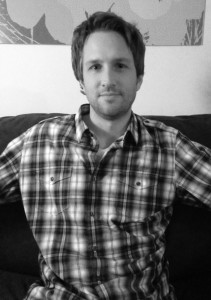 Kevin Chroust’s creative nonfiction has been included in The Best American Travel Writing 2013, published by The Morning News and featured on American Public Media’s The Story. He is a staff writer for STATS, LLC, a worldwide sports information and technology company. Chroust’s sportswriting has appeared in The New York Times, Washington Post, San Francisco Chronicle, and on SportsIllustrated.com, ESPN.com and most major sports websites. He has contributed to Yahoo! Sports and The Nervous Breakdown, a literary collective which excerpted his recently completed memoir, Fix. Follow him on Twitter @kevinchroust.
Kevin Chroust’s creative nonfiction has been included in The Best American Travel Writing 2013, published by The Morning News and featured on American Public Media’s The Story. He is a staff writer for STATS, LLC, a worldwide sports information and technology company. Chroust’s sportswriting has appeared in The New York Times, Washington Post, San Francisco Chronicle, and on SportsIllustrated.com, ESPN.com and most major sports websites. He has contributed to Yahoo! Sports and The Nervous Breakdown, a literary collective which excerpted his recently completed memoir, Fix. Follow him on Twitter @kevinchroust.

